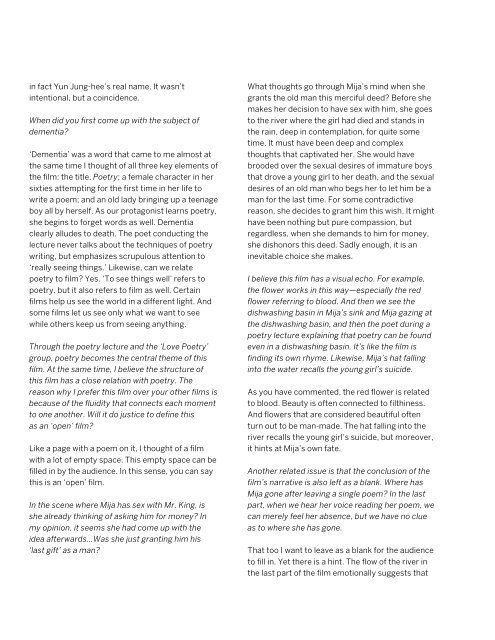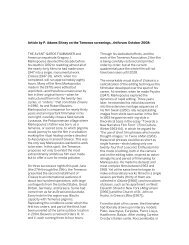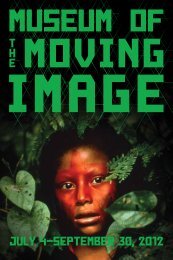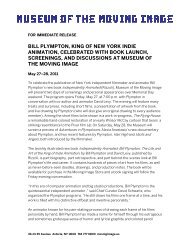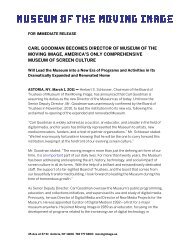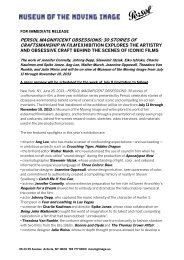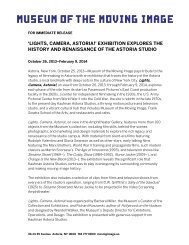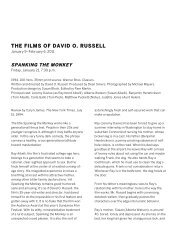POETRY program note - Museum of the Moving Image
POETRY program note - Museum of the Moving Image
POETRY program note - Museum of the Moving Image
Create successful ePaper yourself
Turn your PDF publications into a flip-book with our unique Google optimized e-Paper software.
in fact Yun Jung-hee’s real name. It wasn’tintentional, but a coincidence.When did you first come up with <strong>the</strong> subject <strong>of</strong>dementia?‘Dementia’ was a word that came to me almost at<strong>the</strong> same time I thought <strong>of</strong> all three key elements <strong>of</strong><strong>the</strong> film: <strong>the</strong> title, Poetry; a female character in hersixties attempting for <strong>the</strong> first time in her life towrite a poem; and an old lady bringing up a teenageboy all by herself. As our protagonist learns poetry,she begins to forget words as well. Dementiaclearly alludes to death. The poet conducting <strong>the</strong>lecture never talks about <strong>the</strong> techniques <strong>of</strong> poetrywriting, but emphasizes scrupulous attention to‘really seeing things.’ Likewise, can we relatepoetry to film? Yes. ‘To see things well’ refers topoetry, but it also refers to film as well. Certainfilms help us see <strong>the</strong> world in a different light. Andsome films let us see only what we want to seewhile o<strong>the</strong>rs keep us from seeing anything.Through <strong>the</strong> poetry lecture and <strong>the</strong> ‘Love Poetry’group, poetry becomes <strong>the</strong> central <strong>the</strong>me <strong>of</strong> thisfilm. At <strong>the</strong> same time, I believe <strong>the</strong> structure <strong>of</strong>this film has a close relation with poetry. Thereason why I prefer this film over your o<strong>the</strong>r films isbecause <strong>of</strong> <strong>the</strong> fluidity that connects each momentto one ano<strong>the</strong>r. Will it do justice to define thisas an ‘open’ film?Like a page with a poem on it, I thought <strong>of</strong> a filmwith a lot <strong>of</strong> empty space. This empty space can befilled in by <strong>the</strong> audience. In this sense, you can saythis is an ‘open’ film.In <strong>the</strong> scene where Mija has sex with Mr. King, isshe already thinking <strong>of</strong> asking him for money? Inmy opinion, it seems she had come up with <strong>the</strong>idea afterwards…Was she just granting him his‘last gift’ as a man?What thoughts go through Mija’s mind when shegrants <strong>the</strong> old man this merciful deed? Before shemakes her decision to have sex with him, she goesto <strong>the</strong> river where <strong>the</strong> girl had died and stands in<strong>the</strong> rain, deep in contemplation, for quite sometime. It must have been deep and complexthoughts that captivated her. She would havebrooded over <strong>the</strong> sexual desires <strong>of</strong> immature boysthat drove a young girl to her death, and <strong>the</strong> sexualdesires <strong>of</strong> an old man who begs her to let him be aman for <strong>the</strong> last time. For some contradictivereason, she decides to grant him this wish. It mighthave been nothing but pure compassion, butregardless, when she demands to him for money,she dishonors this deed. Sadly enough, it is aninevitable choice she makes.I believe this film has a visual echo. For example,<strong>the</strong> flower works in this way—especially <strong>the</strong> redflower referring to blood. And <strong>the</strong>n we see <strong>the</strong>dishwashing basin in Mija’s sink and Mija gazing at<strong>the</strong> dishwashing basin, and <strong>the</strong>n <strong>the</strong> poet during apoetry lecture explaining that poetry can be foundeven in a dishwashing basin. It’s like <strong>the</strong> film isfinding its own rhyme. Likewise, Mija’s hat fallinginto <strong>the</strong> water recalls <strong>the</strong> young girl’s suicide.As you have commented, <strong>the</strong> red flower is relatedto blood. Beauty is <strong>of</strong>ten connected to filthiness.And flowers that are considered beautiful <strong>of</strong>tenturn out to be man-made. The hat falling into <strong>the</strong>river recalls <strong>the</strong> young girl’s suicide, but moreover,it hints at Mija’s own fate.Ano<strong>the</strong>r related issue is that <strong>the</strong> conclusion <strong>of</strong> <strong>the</strong>film’s narrative is also left as a blank. Where hasMija gone after leaving a single poem? In <strong>the</strong> lastpart, when we hear her voice reading her poem, wecan merely feel her absence, but we have no clueas to where she has gone.That too I want to leave as a blank for <strong>the</strong> audienceto fill in. Yet <strong>the</strong>re is a hint. The flow <strong>of</strong> <strong>the</strong> river in<strong>the</strong> last part <strong>of</strong> <strong>the</strong> film emotionally suggests that


